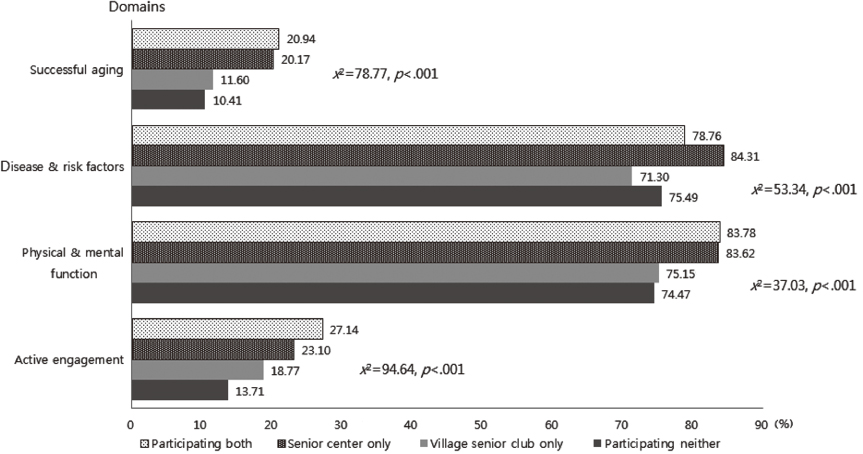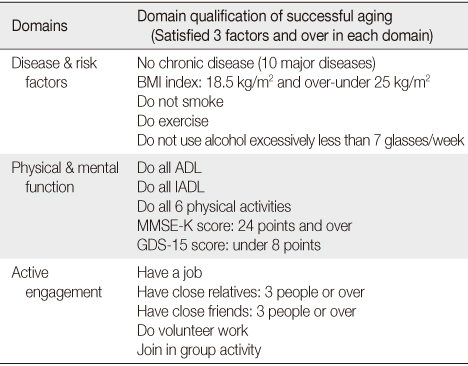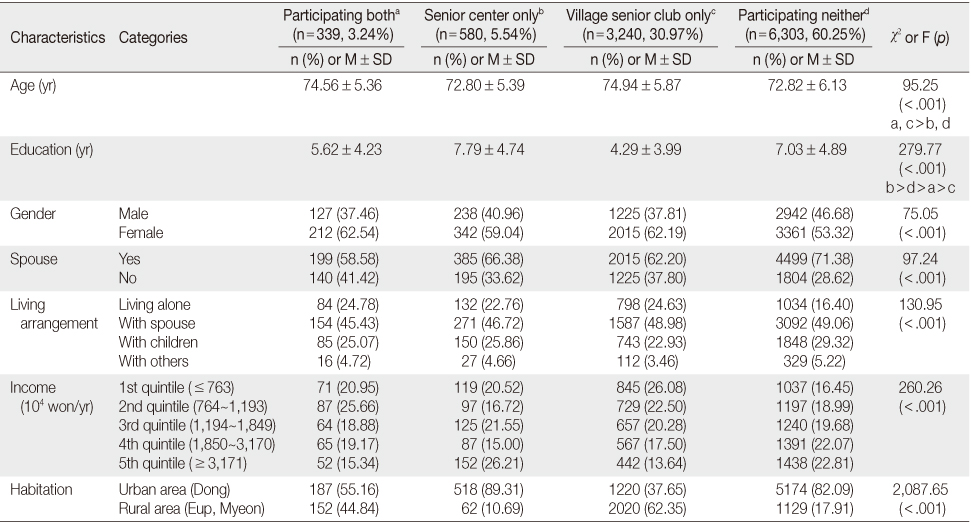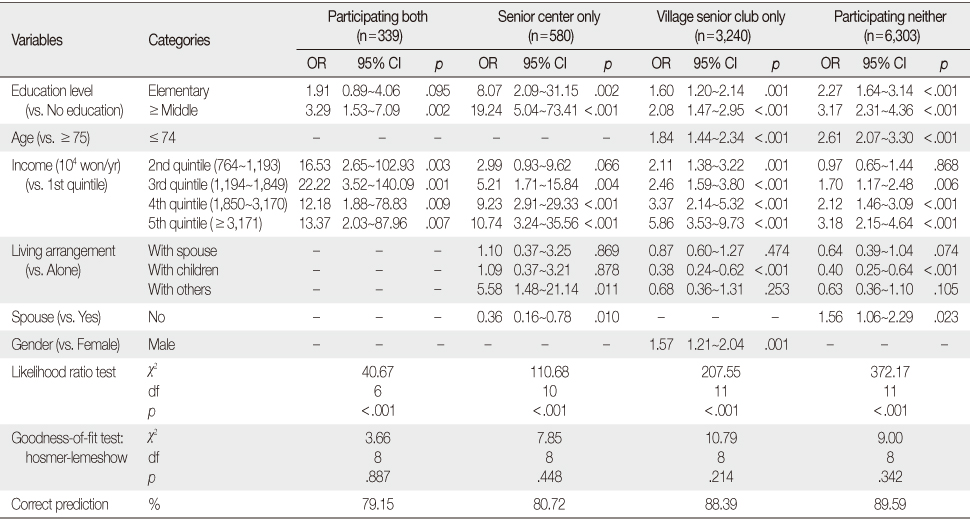Articles
- Page Path
- HOME > J Korean Acad Nurs > Volume 45(2); 2015 > Article
-
Original Article
- Successful Aging of Korean Older Adults based on Rowe and Kahn's Model: A Comparative Study According to the Use of Community Senior Facilities
- Soo Jin Lee, Misoon Song
-
Journal of Korean Academy of Nursing 2015;45(2):231-239.
DOI: https://doi.org/10.4040/jkan.2015.45.2.231
Published online: April 30, 2015
1College of Nursing, Seoul National University, Seoul, Korea.
2College of Nursing·The Research Institute of Nursing Science, Seoul National University, Seoul, Korea.
- Address reprint requests to: Song, Misoon. College of Nursing, Seoul National University, 103 Daehak-ro, Jongno-gu, Seoul 110-799, Korea. Tel: +82-2-740-8826, Fax: +82-2-764-8457, msong@snu.ac.kr
© 2015 Korean Society of Nursing Science
This is an Open Access article distributed under the terms of the Creative Commons Attribution NoDerivs License. (http://creativecommons.org/licenses/by-nd/4.0/) If the original work is properly cited and retained without any modification or reproduction, it can be used and re-distributed in any format and medium.
Abstract
-
Purpose
- This study was conducted to examine the prevalence of successful aging and factors influencing successful aging.
-
Methods
- This was a secondary analysis study. Data were analyzed from 10,462 elderly people who participated in the 2011 National Elderly Survey. According to the use of community senior facilities, participants were divided into 4 groups: those who used senior centers (group A, n=580), village senior clubs (group B, n=3,240), both of the 2 facilities (group C, n=339), and neither of the 2 facilities (group D, n=6,303). Cross-tabulation and logistic regression were performed.
-
Results
- The prevalence of successful aging was highest in group C (20.94%) and lowest in group D (10.41%). The physical & mental function and active engagement domains were highest in group C, while they were lowest in group D. The disease & risk factors domain were highest in group A, while lowest in group B. An educational level of middleschool or higher and income level in the third or higher quintile were significant factors for predicting successful aging in all groups.
-
Conclusion
- These results provide a basis for designing prevention and management programs as interventions to increase the prevalence of successful aging in Korean older adults.
This research was supported by the Basic Science Research Program through the National Research Foundation of Korea (NRF) funded by the Ministry of Science, ICT & Future Planning (No. 2013R1A1A2008571).
- 1. Statistics Korea. 2012 life tables for Korea [Internet]. Daejeon, Author. 2013;2014 September 1. Available from: http://kostat.go.kr/portal/korea/kor_nw/3/index.board?bmode=download&bSeq=&aSeq=310491&ord=1
- 2. Rowe JW, Kahn RL. Successful aging. New York, NY: Pantheon Books; 1998.
- 3. An JS, Chong YS, Jeong YJ, Seo SG, Cooney TM. Critical aspirations from studies of successful aging. Korean J Dev Psychol. 2011;24(3):35–54.
- 4. Cosco TD, Prina AM, Perales J, Stephan BC, Brayne C. Operational definitions of successful aging: A systematic review. Int Psychogeriatr. 2014;26(3):373–381. ArticlePubMed
- 5. Sung H, Cho HS. A sudy of successful aging model: Using the components of Rowe & Kahn. J Korean Gerontol Soc. 2006;26(1):105–123.
- 6. Kim KH, Kim JH. Influences of life satisfaction on successful aging: Focusing on the elderly having partners. Korean J Fam Welf. 2008;13(2):87–106.
- 7. Depp CA, Jeste DV. Definitions and predictors of successful aging: A comprehensive review of larger quantitative studies. Am J Geriatr Psychiatry. 2006;14(1):6–20.ArticlePubMed
- 8. Ministry of Health & Welfare. Korea Centers for Disease Control & Prevention. Korea health statistics 2013: Korea national health and nutrition examination survey (KNHANES V-3). Seoul: Ministry of Health & Welfare; 2014.
- 9. SunWoo D, Oh YH, Lee S, Oh JS, Lee SG. The future policy issues for health of the eldery: Construction of functional independence promotion system of everyday living activity. Seoul: Korea Institute for Health and Social Affairs; 2009.12;Report No.: Research Report 2009-22.
- 10. Jeong GH, Oh YH, Lee YK, Son CG, Park BM, Lee SY, et al. A survey of Korean older persons. Seoul: Ministry of Health and Welfare, Korean Institute of Health and Social Welfare; Report No.: Policy Report 2012-04.
- 11. Kim SH, Song MS. The health services of Korean senior centers. J Korean Gerontol Nurs. 2006;8(1):15–23.
- 12. Kim KH. District centre for elderly to use the form on the effect of ego integrity and successful aging [master's thesis]. Daegu, Kyongbuk University of Foreign Studies. 2011.
- 13. Krout JA, Cutler SJ, Coward RT. Correlates of senior center participation: A national analysis. Gerontologist. 1990;30(1):72–79.ArticlePubMed
- 14. Pardasani M. Senior centers: Characteristics of participants and nonparticipants. Act, Adapt Aging. 2010;34(1):48–70. Article
- 15. Eun Y, Gu MO, Kim ES, Kang YS. A comparative study of the health state and need of health-related service between elderly attending the senior welfare center and elderly attending the senior citizens' club. J Korean Gerontol Nurs. 2001;3(1):7–21.
- 16. Huh MD, Ha CK. Comparative analysis of satisfaction in physical activity of the aged in welfare center and in the hall for the aged. Korea J Sport Sci. 2006;15(3):633–646.
- 17. Han SJ, Han JS, Moon YS. Factors influencing successful aging in elders. J Korean Acad Adult Nurs. 2009;21(4):423–434.
- 18. Strawbridge WJ, Wallhagen MI, Cohen RD. Successful aging and well-being: Self-rated compared with Rowe and Kahn. Gerontologist. 2002;42(6):727–733.PubMed
- 19. Weir PL, Meisner BA, Baker J. Successful aging across the years: Does one model fit everyone? J Health Psychol. 2010;15(5):680–687. ArticlePubMedPDF
- 20. Korean Society for the Study of Obesity. 2012 guideline for management of obesity [Internet]. Seoul, Author. 2012;2014 August 25. Available from: http://www.kosso.or.kr/main.html
- 21. Almeida OP, Norman P, Hankey G, Jamrozik K, Flicker L. Successful mental health aging: Results from a longitudinal study of older Australian men. Am J Geriatr Psychiatry. 2006;14(1):27–35. ArticlePubMed
- 22. Seeman TE, Rodin J, Albert M. Self-efficacy and cognitive performance in high-functioning older individuals: MacArthur studies of successful aging. J Aging Health. 1993;5(4):455–474. ArticlePDF
- 23. Strawbridge WJ, Cohen RD, Shema SJ, Kaplan GA. Successful aging: Predictors and associated activities. Am J Epidemiol. 1996;144(2):135–141.ArticlePubMed
- 24. Rikli RE, Jones CJ. Senior fitness test manual. Champaign, IL: Human Kinetics; 2001.
- 25. Kwon YC, Park JH. Korean version of mini-mental state examination (MMSE-K): Part I: Development of the test for the elderly. J Korean Neuropsychiatr Assoc. 1989;28(1):125–135.
- 26. Cho MJ, Bae JN, Suh GH, Hahm BJ, Kim JK, Lee DW, et al. Validation of geriatric depression scale, Korean version (GDS) in the assessment of DSM-III-R major depression. J Korean Neuropsychiatr Assoc. 1999;38(1):48–62.
- 27. Hong SH. Binary & multinomial logistic regression. Paju: Kyoyook-book; 2005.
- 28. McLaughlin SJ, Connell CM, Heeringa SG, Li LW, Roberts JS. Successful aging in the United States: Prevalence estimates from a national sample of older adults. J Gerontol B Psychol Sci Soc Sci. 2010;65B(2):216–226. ArticlePubMed
- 29. Yoon HS, Yoo HJ, Rie JI, Kim DH, Kim YB, Park KS, et al. Life fulfillment and regrets: Comparison between the "success" group and the "unsuccess" group. Ment Health Soc Work. 2008;28:5–35.
- 30. Jeong GH, Lee YK, Park BM, Lee SJ, Lee YH. Analysis of the survey of living conditions and welfare needs of older Koreans. Seoul: Korea Institute for Health and Social Affairs; 2012.12;Report No.: Research Report 2012-47-14.
REFERENCES
Successful aging in the elderly participants according to use of community senior facilities.

Figure & Data
REFERENCES
Citations

- Changes in successful aging and its related indicators among community-dwelling older adults: The Korean Frailty and Aging Cohort Study (KFACS)
Hohyun Seong, Sohee Kim, Hyunsook Shin, Chang Won Won, Youn-Jung Kim
Geriatric Nursing.2024; 59: 392. CrossRef - Comparative analysis of successful aging in young-old and old-old adults based on Rowe and Kahn’s model: A secondary data analysis
Ji Eun Lee
Journal of Korean Gerontological Nursing.2024; 26(2): 203. CrossRef - Using an adaptive network-based fuzzy inference system for prediction of successful aging: a comparison with common machine learning algorithms
Azita Yazdani, Mostafa Shanbehzadeh, Hadi Kazemi-Arpanahi
BMC Medical Informatics and Decision Making.2023;[Epub] CrossRef - Prediction of successful aging using ensemble machine learning algorithms
Zahra Asghari Varzaneh, Mostafa Shanbehzadeh, Hadi Kazemi-Arpanahi
BMC Medical Informatics and Decision Making.2022;[Epub] CrossRef - Associations of the related factors of depression, social support and social participation in kyungro‐dang among older adults in South Korea: A structural equation modelling analysis
Hocheol Lee, Seokjun Moon, Geurum Song, Eun Woo Nam
Nursing Open.2021; 8(2): 562. CrossRef - Factors Associated with Successful Aging among Community-Dwelling Older Adults Based on Ecological System Model
Hye-Young Jang
International Journal of Environmental Research and Public Health.2020; 17(9): 3220. CrossRef - The Effect of Basic Psychological Needs and Wisdom on Successful Aging in the Elderly
Min-Jeong Nam, Young-Mun Cho
Korean Journal of Adult Nursing.2018; 30(1): 70. CrossRef - Factors Affecting the Successful Aging of Late Middle-Aged Adults
YonJi Kim, JuHee Lee, Young Joo Lee
Korean Journal of Health Promotion.2018; 18(2): 90. CrossRef - Correlates of Successful Aging in South Korean Older Adults: A Meta-Analytic Review
Sin-Hyang Kim, Sihyun Park, Kyung-Sook Park
Asia Pacific Journal of Public Health.2017; 29(7): 544. CrossRef - Successful Aging and the Influencing Factors in the Korean Elderly: Focused on Family Support
SongYi Han, Soon-Nyung Yun
Journal of Korean Academy of Community Health Nursing.2015; 26(4): 372. CrossRef

Figure 1
Operational Definition of Successful Aging based on Rowe & Kahn's Model
ADL=Activity of daily living; IADL=Instrumental activity of living; MMSE-K=Mini mental state examination-Korea; GDS-15=Geriatric depression scale-15; By definition, successful aging means fulfillment of all 3 domains.
Comparison of Socio-demographic Characteristics in Participants according to the Use of Community Senior Facilities (N =10,462)
Logistic Regression of Successful Aging by Socio-demographic Characteristics in Individual Groups (N =10,462)
OR=Odds ratio; CI=Confidence interval.
ADL=Activity of daily living; IADL=Instrumental activity of living; MMSE-K=Mini mental state examination-Korea; GDS-15=Geriatric depression scale-15; By definition, successful aging means fulfillment of all 3 domains.
OR=Odds ratio; CI=Confidence interval.
 KSNS
KSNS
 E-SUBMISSION
E-SUBMISSION



 Cite
Cite

